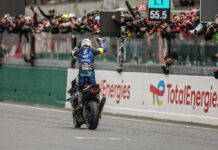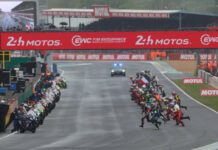By Michael Gougis If the folks from American Honda’s motorcycle division really are considering throwing their support behind a new road racing series to compete with the AMA/DMG series next year, they need to get up from their desks, walk across the aisle to their automotive racing counterparts, and say, “So, we’re thinking of backing a breakaway racing series. Got any thoughts on that?” When the car guys stop choking and spitting coffee onto their computer monitors and manage to start breathing again, they’ll probably gasp out one word of advice: Don’t. The few remaining fans of open-wheel motorsports in the United States can remember a time when Championship Auto Racing Teams posed a direct threat to Formula One on the world stage. I say the few remaining fans because a decade of competing racing series essentially destroyed open-wheel racing in the U.S. Honda was there for the whole thing. When open-wheel racing split in 1996, the company backed CART over the rival Indy Racing League, which was dismissed as a low-tech, lowbrow form of racing, clearly second-fiddle to the technologically advanced turbo-powered Champ cars. Over the next decade, Honda would wind up changing its mind on virtually every decision it made in open-wheel racing, ending up as the only supplier of a spec-engined series of normally aspirated cars. Simply put, if anyone knows the damage that can be inflicted on a sport by even the talk of a breakaway series, it’s Honda. While published reports indicate that Honda and Suzuki are the main proponents of a motorcycle road racing series that would compete with the AMA/DMG races next season, Suzuki hasn’t been through this before. Honda has. It’s not an exact analogy, but it’s pretty close to what I feel would be a worst-case scenario for next year in motorcycle road racing. When open-wheel racing split, the IRL was viewed by many as the breakaway series. But really, it’s more accurate to view CART as trying to break away from Indy. When it went its own Indy-less way, CART was well-armed. It had the stars, more advanced cars, and many of the traditional race venues locked up. When CART went public in the last part of the decade, it had a war chest of more than $100 million. Honda, Toyota, Ford and Mercedes-Benz provided engines to teams. Honda and Toyota dug deeper than others, paying driver salaries and offering technological advantages (wind tunnel time, etc.) for favored teams. And CART was a team-owned series. In other words, those manufacturers had in open-wheel racing what proponents of a breakaway series are calling for in motorcycle road racing: A manufacturer-run program, well-funded, with everything except the series’ signature event. And at the beginning, it seemed to work well. CART ran a 500-mile race at Michigan on the same day as the Indy 500 in 1996, and winner Jimmy Vasser took a swipe at one of the longest traditions in motorsports when he sneered, “Who needs milk?” (Traditionally, the winner of the Indy 500 takes a swig from a bottle of milk in Victory Lane.) But it all fell apart. One key miscalculation: The presence of Indianapolis in the American racing public’s consciousness. CART forgot that its stars and the popularity of all the other events were based on their link to Indy. And as the years piled up, CART became defined in the public’s mind as the open-wheel cars that DIDN’T do the Indy 500. Race promoters were unable to ask fans to come to their races to see the winner of the Indy 500, as they’d done for years. Attendance at CART events fell year after year. Road America, Laguna Seca, Mid-Ohio all venues that once hosted massive open-wheel celebrations either fell off the calendar or saw attendance drop to a fraction of what it once was. Teams and drivers, too, pined for the chance to win at what they felt, in their hearts, was the one race the only race you had to win in your career. Everything else paled compared to a win at Indy. Another key miscalculation: The gamble that manufacturers would always be able to get along. With varying budgets, marketing plans, and other influences, the infighting intensified. Within six years, all four of the manufacturers left CART, which wound up buying an engine company, building a spec turbo motor, and leasing it to the teams that still wanted to come play which were fewer and fewer each year. As manufacturer support dropped off, teams found it easier to sell themselves to sponsors who knew only one word when it came to open-wheel racing: Indy. Honda literally threw a fit “It was a very emotional announcement,” Robert Clarke, now president of Honda Performance Development, told a news conference over CART’s proposed rules changes in 2002 and announced it was leaving open-wheel racing in the United States. A cynic might have noted that Honda was looking for a way to desert a sinking ship. A few months later, Honda changed its mind. The low-tech IRL that it once dismissed? Honda would provide engines for that series. Honda’s longtime policy of in-house technology development? Tossed out the window. In its rush to do a U-turn and get into the IRL for 2003, Honda basically badge-engineered an Ilmor powerplant. Honda’s disdain for spec racing series? That went by the wayside in 2006, when Honda agreed to provide identical engines to everyone racing in the IRL. Time after time, Honda wound up eating its own words. When the two series reunited this year, 12 years after “The Split,” Honda found itself the only engine provider in a series it once turned its back on. But it wasn’t exactly the same series. Overall attendance was a fraction of its former self; the TV ratings for its non-Indy events now are somewhere around infomercial levels. Honda’s technological challenges its oft-cited reason for racing have basically been reduced to questions of production rather than R&D. It’s not about getting more horsepower, torque, reliability or speed; it’s about making enough race engines for all the teams. And quick, name the last three winners of the Indy 500. There was a time when they were cultural heroes, even outside the world of motorsports. Now, they couldn’t get arrested. Is there a parallel here? Stronger than you might suspect. Substitute “DMG” for “IRL” and “Daytona” for “Indy 500″ and you get pretty close. DMG and the IRL are well-funded organizations headed by strong-willed, richer-than-hell individuals who don’t mind being called names and are willing to spend money to keep their organizations afloat. And like the IRL owned the Indy 500, DMG owns the most well-known national motorcycle road race the Daytona 200. Like Indianapolis, Daytona has a resonance with the American motorsports public that only Indy comes close to. Everyone knows what the Daytona International Speedway is. You’d be hard-pressed to find an average motorsports fan in the U.S. who could find Road America on a map. Hell, you’d be hard-pressed to find an average motorsports fan in the U.S. who could find Road Atlanta even if you gave them a map of Georgia. And ask any national-level motorcycle road racer what race they would like to win if they could only win one race in their lifetime. Dollars to dimes the answer’s Daytona. So if the motorcycle manufacturers start their own series, they may well wind up in a situation exactly like the CART of old. They may have money, machines, and the established stars. But they will be competing against someone with as much or more money, someone with media savvy, a series of tracks with traditional events, and who perhaps crucially, history suggests owns the series that will hold the only motorcycle road race that many Americans have ever heard of. The manufacturers will constantly be explaining that they’re not the group that races at Daytona. It’s an argument I wouldn’t want to have to make. Simply put, the American fan doesn’t have that kind of time and attention. And the manufacturers will have to do this while resolving disputes between themselves by themselves and then convincing everyone else (privateers, outside sponsors) that they’re playing fair among themselves and also not making “gentleman’s agreements” among themselves. Breakaway series have a lousy track record. Honda backed a one-year split in Supercross in 1984, but that rift was quickly repaired. The CART/IRL fiasco has had one positive outcome. When rifts threatened to develop in other series (as was the case in Formula One), all someone had to do was say, “Look at what happened in the United States,” and everyone came back to the negotiating table quickly. No one wanted to create the next CART/IRL. Seriously, can anyone name a successful breakaway series that survived while competing with its predecessor? If there is one, it’s a rarity. The damage to open-wheel racing, many feel, may be beyond repair. The fan base fractured. Outside-the-industry money gravitated to NASCAR. Few fans truly, honestly, believe that IndyCar racing will ever reach the level again where Formula One feared it on the international stage. While Suzuki, Kawasaki, and maybe even Yamaha might be looking into a breakaway series with some level of naivety, Honda knows better. Its representatives have been involved in CART, the IRL, the threatened manufacturer-led Formula One breakaway. Honda knows the odds of it being successful with a similar plan for motorcycle road racing are extremely long at best, and the potential damage to itself and the rest of the sport catastrophic. Even rumors can damage the chances of teams getting sponsors. While the DMG show might not be perfect (I’ve got real issues with the ‘run in the rain’ plans for some tracks), creating an opposing series would cause far more problems than it would solve. Talk of a breakaway series needs to stop now. And now, a reader comments… FIRST PERSON/OPINION Via e-mail: Did any of the MIC members do the obvious and actually put a bid in for AMA Pro Racing when they had the chance, or was whining after the fact their only long-term strategy? Brady Ward Raymond, New Hampshire
FIRST PERSON/OPINION: Honda Has Backed A Breakaway Series Before, And It Wasn’t Good
FIRST PERSON/OPINION: Honda Has Backed A Breakaway Series Before, And It Wasn’t Good
© 2008, Roadracing World Publishing, Inc.






